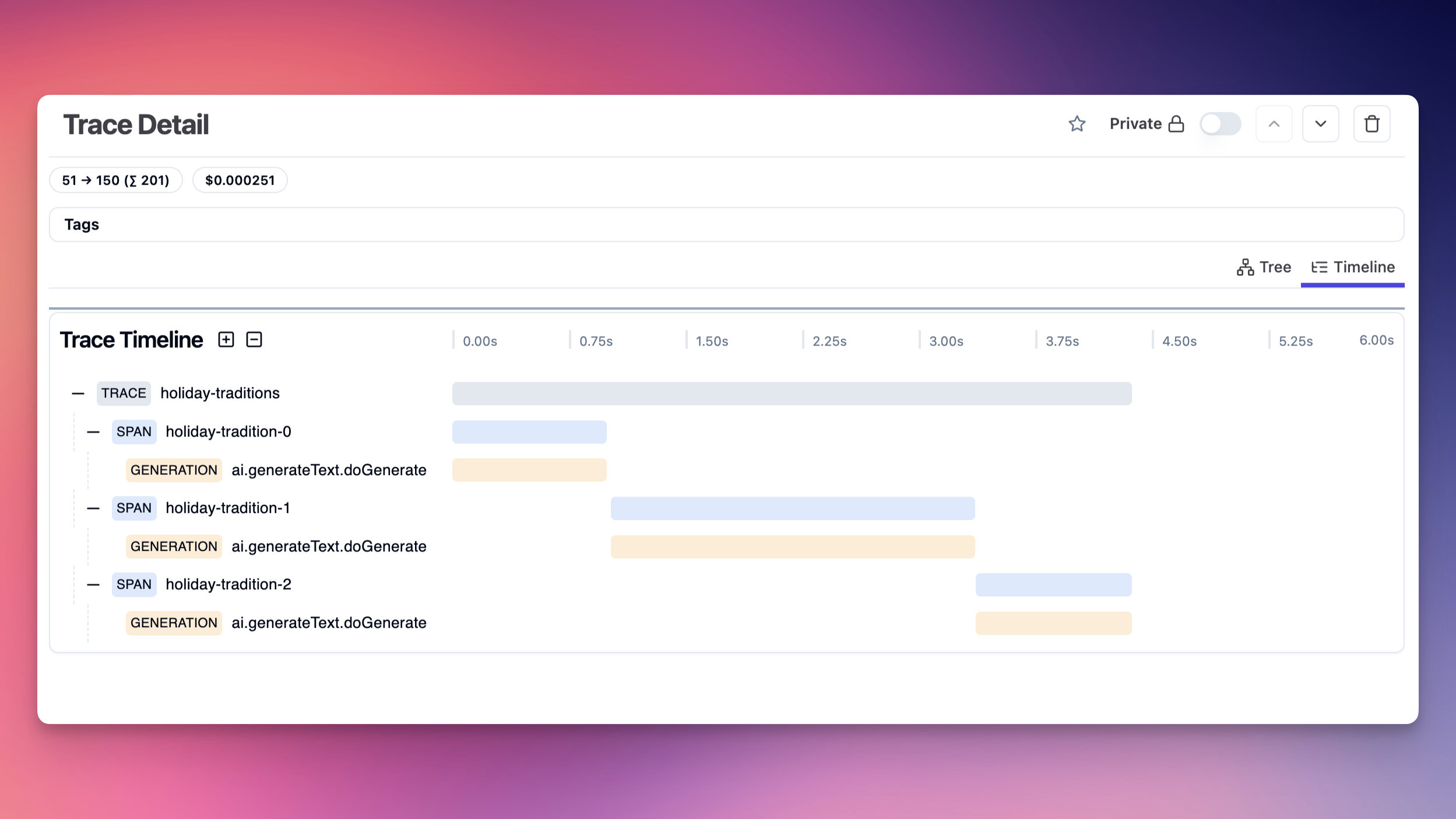Langfuse Observability
Langfuse (GitHub) is an open source LLM engineering platform that helps teams to collaboratively develop, monitor, and debug AI applications. Langfuse integrates with the AI SDK to provide:
- Application traces
- Usage patterns
- Cost data by user and model
- Replay sessions to debug issues
- Evaluations
Setup
The AI SDK supports tracing via OpenTelemetry. With the LangfuseExporter you can collect these traces in Langfuse.
While telemetry is experimental (docs), you can enable it by setting experimental_telemetry on each request that you want to trace.
const result = await generateText({ model: openai('gpt-4o'), prompt: 'Write a short story about a cat.', experimental_telemetry: { isEnabled: true },});To collect the traces in Langfuse, you need to add the LangfuseExporter to your application.
You can set the Langfuse credentials via environment variables or directly to the LangfuseExporter constructor.
To get your Langfuse API keys, you can self-host Langfuse or sign up for Langfuse Cloud here. Create a project in the Langfuse dashboard to get your secretKey and publicKey.
LANGFUSE_SECRET_KEY="sk-lf-..."LANGFUSE_PUBLIC_KEY="pk-lf-..."LANGFUSE_BASEURL="https://cloud.langfuse.com" # 🇪🇺 EU region, use "https://us.cloud.langfuse.com" for US regionNow you need to register this exporter via the OpenTelemetry SDK.
Next.js has support for OpenTelemetry instrumentation on the framework level. Learn more about it in the Next.js OpenTelemetry guide.
Install dependencies:
npm install @vercel/otel langfuse-vercel @opentelemetry/api-logs @opentelemetry/instrumentation @opentelemetry/sdk-logsAdd LangfuseExporter to your instrumentation:
import { registerOTel } from '@vercel/otel';import { LangfuseExporter } from 'langfuse-vercel';
export function register() { registerOTel({ serviceName: 'langfuse-vercel-ai-nextjs-example', traceExporter: new LangfuseExporter(), });}Done! All traces that contain AI SDK spans are automatically captured in Langfuse.
Example Application
Check out the sample repository (langfuse/langfuse-vercel-ai-nextjs-example) based on the next-openai template to showcase the integration of Langfuse with Next.js and AI SDK.
Configuration
Group multiple executions in one trace
You can open a Langfuse trace and pass the trace ID to AI SDK calls to group multiple execution spans under one trace. The passed name in functionId will be the root span name of the respective execution.
import { randomUUID } from 'crypto';import { Langfuse } from 'langfuse';
const langfuse = new Langfuse();const parentTraceId = randomUUID();
langfuse.trace({ id: parentTraceId, name: 'holiday-traditions',});
for (let i = 0; i < 3; i++) { const result = await generateText({ model: openai('gpt-3.5-turbo'), maxTokens: 50, prompt: 'Invent a new holiday and describe its traditions.', experimental_telemetry: { isEnabled: true, functionId: `holiday-tradition-${i}`, metadata: { langfuseTraceId: parentTraceId, langfuseUpdateParent: false, // Do not update the parent trace with execution results }, }, });
console.log(result.text);}
await langfuse.flushAsync();await sdk.shutdown();The resulting trace hierarchy will be:

Disable Tracking of Input/Output
By default, the exporter captures the input and output of each request. You can disable this behavior by setting the recordInputs and recordOutputs options to false.
Link Langfuse prompts to traces
You can link Langfuse prompts to AI SDK generations by setting the langfusePrompt property in the metadata field:
import { generateText } from 'ai';import { Langfuse } from 'langfuse';
const langfuse = new Langfuse();
const fetchedPrompt = await langfuse.getPrompt('my-prompt');
const result = await generateText({ model: openai('gpt-4o'), prompt: fetchedPrompt.prompt, experimental_telemetry: { isEnabled: true, metadata: { langfusePrompt: fetchedPrompt.toJSON(), }, },});The resulting generation will have the prompt linked to the trace in Langfuse. Learn more about prompts in Langfuse here.
Pass Custom Attributes
All of the metadata fields are automatically captured by the exporter. You can also pass custom trace attributes to e.g. track users or sessions.
const result = await generateText({ model: openai('gpt-4o'), prompt: 'Write a short story about a cat.', experimental_telemetry: { isEnabled: true, functionId: 'my-awesome-function', // Trace name metadata: { langfuseTraceId: 'trace-123', // Langfuse trace tags: ['story', 'cat'], // Custom tags userId: 'user-123', // Langfuse user sessionId: 'session-456', // Langfuse session foo: 'bar', // Any custom attribute recorded in metadata }, },});Debugging
Enable the debug option to see the logs of the exporter.
new LangfuseExporter({ debug: true });Troubleshooting
- If you deploy on Vercel, Vercel's OpenTelemetry Collector is only available on Pro and Enterprise Plans (docs).
- You need to be on
"ai": "^3.3.0"to use the telemetry feature. In case of any issues, please update to the latest version. - On NextJS, make sure that you only have a single instrumentation file.
- If you use Sentry, make sure to either:
- set
skipOpenTelemetrySetup: truein Sentry.init - follow Sentry's docs on how to manually set up Sentry with OTEL
- set
Learn more
- After setting up Langfuse Tracing for the AI SDK, you can utilize any of the other Langfuse platform features:
- Prompt Management: Collaboratively manage and iterate on prompts, use them with low-latency in production.
- Evaluations: Test the application holistically in development and production using user feedback, LLM-as-a-judge evaluators, manual reviews, or custom evaluation pipelines.
- Experiments: Iterate on prompts, models, and application design in a structured manner with datasets and evaluations.
- For more information, see the telemetry documentation of the AI SDK.